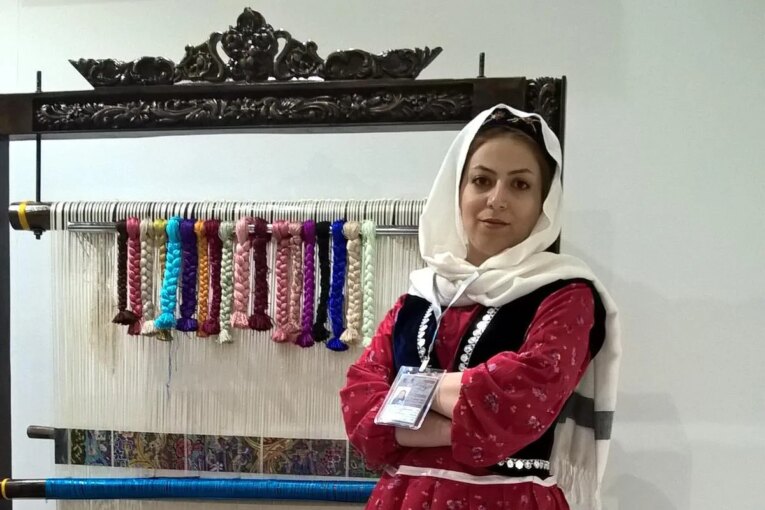
[ad_1]
As a toddler, Rokhsar MousaviNezhad was mesmerized by the colourful motifs and designs of the handmade Persian carpets displayed in her grandfather’s studio in Shiraz, a city considered Iran’s cultural capital.
It’s where she fell in love with the craft of carpet-making and designs, and took her first dip into knotting and weaving with loom, combs and a traditional tool called gholab.
“I am proud of myself that I have continued my grandfather’s job,” says the now 41-year-old, who has built a career teaching the craft, displaying her work in shows and running her own carpet business.
It’s these skills and knowledge that she was banking on when she applied in 2016 for permanent residence in Canada under the self-employed immigration program, which aims at luring exemplary athletes, artists and farmers to this country.
Yet MousaviNezhad was rejected in 2018 for failing to demonstrate the ability and intent to become self-employed in Canada. Her refusal is among 105 cases entangled in an appeal to be heard collectively by the Federal Court next week.
At issue is whether the “mass” refusals made in “haste” — according to the applicants’ court submissions — of these Iranians by the Canadian visa post in Poland were the direct result of an effort to clear a backlog, allegedly “at the cost of violation of legal principles.”
The submissions say 479 files in the self-employed category were transferred to Warsaw from the backlogged Ankara post in Turkey on March 7, 2018.
“The Warsaw visa post defied all norms, procedural fairness requirements, and reasonable expectations of outcome in its assessment of the … (cases) transferred to it,” the applicants claimed. “Officers moved straight to refusals thereof.”
Almost all litigants were refused for failing to demonstrate their ability and intent to become self-employed in Canada, despite business plans that, in the past, would have met the expectations of the Ankara visa post, according to litigants’ counsel.
Pantea Jafari, lawyer for the 105 Iranians, said self-employed immigration applications are the most labour-intensive for both officials and applicants, since there are few guidelines to assist the assessment and applicants are left in the dark about what evidence would make their case.
“The document checklist does not provide any indication of what documents to provide for ‘relevant experience,’ it just says ‘relevant experience’ and ‘provide what you think is helpful,’” she told the Star.
“That’s it. There’s no reference whatsoever about the ability and intent to be self-employed in Canada.”
Jafari said officials in Ankara routinely requested further documentation and interviews with applicants in addition to a thorough review of the person’s business plan.
“So there was a stark change in the process once things were switched to Warsaw,” Jafari said in an interview. “Now, it’s saying ‘I’m going to refuse the application without any notice to the client.’ That is fundamentally procedurally unfair.”
In her business plan, MousaviNezhad — currently in Montreal — said she was going to run her own studio based in Newmarket, Ont., to teach design and weaving in handmade Persian carpets while marketing and selling her work domestically and internationally, especially to the huge U.S. market.
She also planned to offer classes at schools and community centres, and work with interior designers to create custom-made carpets.
MousaviNezhad said she applied to come to Canada after then-U.S. president Donald Trump banned Iranian-made rugs from entering from any country and restricted the sale of those already in the country.
“Iran is famed for two things: Persian cat and Persian carpet. My business as a part of the rug community has suffered,” said MousaviNezhad, who has a fine art degree in rug design from the Science and Culture University in Yazd and is a licensed carpet-maker in Iran.
“I want to know how I don’t have the ability to be self-employed while I have an academic education as a rug expert and designer, and worked as a freelance artist since 2007.”
In an affidavit, Thomas Richter, Canada’s migration program manager in Warsaw, said the self-employed class is part of economic immigration, where applicants are assessed “on the basis of their ability to become economically established in Canada.”
Qualified candidates, he stated, must have the relevant experience and be able to be self-employed, and must intend and be able to make a contribution to “specified economic activities” in the country.
“I can state with certainty that I am not aware of any policy that is in place at the Canadian Embassy in Warsaw which would serve to discriminate or result in a bias against the clients,” Richter said in his affidavit.
“Each client is assessed on the basis of their individual attributes and in accordance with the criteria outlined.”
The self-employed immigration program was fine-tuned in 2004 to limit it to artists, athletes and farmers after a review found it had been “compromised” by business applicants unable to meet the skilled-worker criteria and unwilling to move to the more restrictive entrepreneur or immigrant investor programs, both of which require huge capital investments.
“A person may be talented and may even have in-depth knowledge, but that does not necessarily mean that the person has the ability to be self-employed; this must be linked to the intention and ability to create his or her own employment,” the government argued in its submissions in the Iranian case.
“Visa officers do not have a duty to seek to clarify a deficient application, to reach out and make an applicant’s case, to apprise an applicant about concerns arising directly from the legislation or regulations, to provide the applicant with a running score at every step of the application process.”
The government has asked the court to dismiss the applicants’ request, which is to have their cases set aside and sent to the Ankara post for redetermination.
Among the 105 who were refused is Milad Bagheri, a classical tenor and traditional Iranian musician, who has performed extensively in Canada, having toured in Toronto, Montreal and Vancouver before applying to the self-employed program in 2018.
In August 2019, the 35-year-old arrived in Toronto with his musician wife, Homa Samiei, on a work permit as a self-employed foreign worker. The duo have been giving vocal and piano lessons, performing online concerts and producing music while collaborating with Canadian composers and musicians.
“Even with COVID’s situation, which you know was tough for artists, we worked and had outstanding achievements.I just had a sold-out show at Toronto’s Meridian Arts Centre and will have another one at Vancouver in September,” said Bagheri after a recent studio recording of a new single.
“They assumed we couldn’t live in Canada as self-employed. As you can see, we are living in Canada as self-employed right now.”
[ad_2]
You can read more of the news on source




